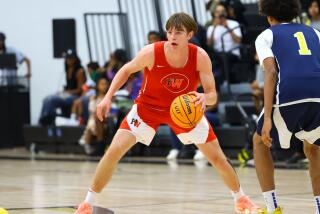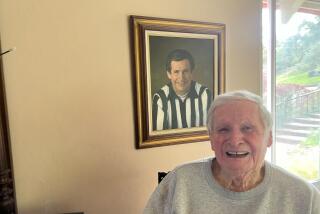Egan’s Work Is Never Done at USD : Basketball: His coaching style and desire survived a stint with low-flying Air Force.
SAN DIEGO — His University of San Diego basketball team had just scored 102 points.
It might have taken the Air Force Academy, Coach Hank Egan’s former employer, the better part of three games and an outbreak of the flu among the opposition to reach that total.
At the Air Force Academy, a fast break was a soda between an engineering system design class and introduction to astronautics. At the Air Force Academy, they jumped to attention. At the Air Force Academy, anyone tall was a visitor.
At the University of San Diego, the big people run and gun and jump. And sometimes, no matter what Egan does, they lose, exactly like they almost always did at the Air Force Academy.
Two nights ago, Egan’s basketball team responded to his urgent and unrelenting insistence to expend every ounce of effort for victory. And yet the Toreros fell short of matching the number of points scored by Loyola Marymount, losing 104-102.
“He did everything he could,” said wife Judy, who has been witness to these no-fault losses before. “The kids played really hard.”
Logic tells Egan he can do everything possible, get everything he can from his charges, and it still won’t always be enough.
But emotionally, “I never buy it. If we work hard and play hard, I think we can win.”
So he goes back to work with his 16-10 team in preparation for tonight’s home contest against West Coast Conference champion Pepperdine.
“He’ll be up all night,” said Carolyn Greer, USD’s trainer, who lives two doors from Egan’s home. “If I went over to his house at 2:30 in the morning, he’d be watching game film to find out what went wrong.
“I’ve seen him on the road after a loss, and he’s so determined to win the next night that he wears his assistant coaches out. They meet, they discuss, they watch film, they go to bed and he gets up at 4 a.m. and knocks on their doors to watch it all again.”
He frets about what he could have done to change the outcome. He replays each minute of play, each substitution. He has lost and lost again, and still he insists on punishing himself with a distasteful review of what went wrong.
“We walk down by Mission Bay and he talks about what he can do to make it better,” said Judy. “We did it today. He always feels like there’s something more he can do. He’s always pointing the finger at himself. It’s always his fault. He beats himself to a pulp. It motivates him. It gets him going.”
While some may want to argue semantics, it has gotten him to the top of his profession. Although his team may not draw Dick Vitale prime-time attention, he has attracted an army of admirers.
He’s as competitive as Bobby Knight, and yet . . .
“I don’t think I’ve ever heard anyone say a bad word about Hank Egan,” said UCLA coach Jim Harrick. “And that’s strange in this business.”
When USD went searching for a new head coach, Knight called USD officials to urge them to hire Egan. Then he wrote a glowing letter of recommendation.
After Knight’s Hoosiers defeated Egan’s Toreros in holiday tournament play earlier this season, Knight was asked why little-known USD had been invited?
“Because Hank Egan is one of the five best defensive coaches in the country,” Knight said, “after me.”
Harrick, who coached against Egan while working at Pepperdine, said, “Let me tell you something about Hank Egan. Everybody is now running this three-out and two-in offense, and the first guy to do that was Hank. He did it when he had that Scott Thompson (1984-1987).
“Shoot, I went down there and talked to Hank about it. A lot of the stuff he was doing, we’re doing right now.”
Jack Avina, who retired as Portland’s head coach, joined Egan as an assistant coach at USD this year. He said, “Egan was the first to bring that offense into the league and it just used to drive us nuts.
“In fact, when I went to Turkey to do some coaching, I put it in. If you went to Turkey today you’d see some of his offense. They probably still call it, ‘San Diego.’ ”
Although Egan’s as tough on referees as a dog on cats, Irv Brown, for one, bears no grudges.
“If Hank was in trouble,” said Brown, who officiated in six Final Fours before retiring to become a broadcaster, “I’d be doing something about it.”
Egan has his engineering degree from the Naval Academy, and now he’s teaching basketball at one of the most renowned educational institutions in the country.
“He’s one of the most intelligent people I’ve ever met,” said John Prunty, who played for former USD coach Jim Brovelli before graduating and becoming an accountant. “You watch his teams play and it’s like watching a clinic.”
As former player Nils Madden said, “It’s real obvious in everything that he does that he cares about winning.”
Winning completes a very long day for Hank Egan.
“No doubt my wanting to win and make the program better is sometimes higher than what’s available,” he said. “The hardest part is that winning is always much more important to the coach than it is to the players. But I’m trying to close that gap.”
Winning is the first thing he mentions in an interview. He has it in perspective, obviously, because he has chosen to pursue winning at places like the Air Force Academy and USD. But it’s his objective, his goal, his every-waking minute.
“After his family,” Greer said, “he’s so intense about basketball. But first comes his family. He has three furry dogs because his family loves dogs . . . and he’s allergic to dogs.
“You know how Hank is. Intense and walking around stern. Last Monday, after his team lost twice on the road, he’s at practice and my 5-year-old runs to him and asks where my husband is. Hank takes him, leaves practice and walks him to the weight room where my husband was.”
There is nothing his dour expression, however, to show that. But people notice.
“He’s a driven man,” said Avina, “but not (driven) to be the best coach in the country. I think with the background he has there are things he thinks kids can relate to. This is a guy who puts kids first.”
Egan has come a long way. His mother died four hours after he was born. Because his father suffered from a hearing disability, he was raised by two of his father’s sisters in Brooklyn.
He went to Niagara University before gaining admission to the Naval Academy and, although not all that happy at Annapolis, he stayed.
“I’m built that way,” he said. “If I start something, I’d like to try like hell to make it work.”
He wasn’t fond of the idea of going to sea, so he entered the Air Force after lettering for three years as a pugnacious guard at the Naval Academy. He retired in 1980 after 20 years of service with the rank of major.
“I wouldn’t call him an unmade bed, but he wasn’t the Duke of Edinburgh,” said Ben Martin, Air Force’s football coach when Egan worked there. “His Naval Academy class probably voted him the most likely to become a civilian first.”
But he can still be military tough. Yelling, lecturing. I’m right, you’re wrong, and if I’m wrong, you still won’t be right.
“He kind of made me nervous when I first met him because he doesn’t say many things,” said Geoff Probst, who starts at guard for USD. “Here’s this person who is very intelligent and he says one or two words to you and you’re wondering what he’s thinking. If he wants, he doesn’t have to smile because he has the ability to keep a straight face.
“But once you get to know him he’ll occasionally throw in a joke. I swear on a Bible I’ve even seen him smile.”
Not after a loss. Not if you’re packing a notebook with the duty to document his postgame remarks.
He makes Charger Coach Dan Henning come off like a Las Vegas entertainer. While always accessible, most of his answers are of one syllable. Deliver a statement rather than a question, and you will get an, “OK.” And then silence.
“You betcha I’m wary of the press,” he said. “Let me give you an example. I won’t mention any names, but we’re playing a game last week and I think it’s a pretty good game, and the guy who is covering us is sitting across the court from me.
“In the middle of the second half, he’s reading a newspaper while the game’s going on, and this is the guy who is going to write an article about what I’m doing for a living. Would you be wary about somebody like that?”
Despite his concern for the media, on close inspection, he’s become a favorite with the sportswriters in this town. He’s honest, he’s direct and he’s good copy.
When asked a while back about one of his freshman performers, Egan said, “He’s not in a panic. But he knows I am, and one of us has to stay cool.”
He’s engaging in those rare moments when basketball escapes his attention. He looks like a child punished when forced to speak publicly, but he has the skill to capture an audience’s fancy.
He’s also unpredictable.
“Last year, Dondi Bell was hanging on the rim and coach got mad,” Probst said. “So he sends Dondi down to the other end of the court to hang on the rim, while we keep practicing.”
Egan picked up the story.
“I told him, ‘Pull the (collapsible) rim down 20 times if it’s so damn important to you,’ ” Egan recalled. “So we’re scrimmaging and he’s down at the other end, and bam, bam, bam, bam, he’s pulling the rim and the noise is so loud it sounds like gunshots.
“I’m trying not to laugh, but after four slams I went to my knees and the players were rolling around the floor. And what made it really funny was Dondi had no idea everybody was watching him and he’s still trying to pull that rim down as hard as he can.”
You had to be there, because that’s not the Egan most people have come to see roaming the sideline on the night of a game. By the time the National Anthem has been played, the tie’s loose and the vocal cords have been stretched.
His hands go deep into his pockets, and then one hand is waving at a guard while the other brushes back his graying hair. He tugs at his pants, slaps the side of his leg and then puts both hands behind his head as if he has a sore neck.
By the time the clock says 18:14 remains in the first half, he has had three glasses of water and chastised two of the game’s three officials for making mistakes.
“He’s mellowed,” said Judy. “I’ve seen him chase the officials into the locker room.”
As the frustration and defeats mounted at Air Force, every walking call that got away was an insurmountable obstacle to success.
“It was the same thing with Bobby Knight at Army,” said Brown. “When I worked Knight’s games at Army, he’d get after you on every play. It was the only way to win. He needed calls.”
At the Air Force Academy, students were required to fit into the cockpit of a fighter jet before they could be given basketball consideration. Sometimes the tallest person on the Falcons’ bench was the coach.
“You played the game so close to the vest because of the limitations, that one call at the wrong time, and the game snapped,” Egan said. “Some of that still carries over with me today, even though there isn’t the same urgent need to be on top of every little thing because we have better players.”
Egan compiled a 148-185 mark at Air Force, a remarkable record considering the hurdles.
“In the beginning, all of us, my son John and daughter Kelly, would sit in the stands and just cry,” Judy said. “We lived and died with Hank at every basketball game. But after awhile, we realized there was nothing we could do, but just love him and let him coach.”
In 1976, he led the Falcons to a 16-9 finish, but Air Force agreed to join the Western Athletic Conference and the basketball program was basement-bound.
“It was an impossible situation,” Martin said.
Egan said, “I’m not a masochist. I don’t know why I stayed except I just always thought I could make it better. I always thought there was a way. Now that I look back, I think there’s no way. I look at the guy (Reggie Minton) who took my place at the Air Force Academy and he has a real hard job.”
Egan fought Air Force’s introduction into the WAC at the time and, after taking a pounding for four seasons, he was fired. The Falcons have compiled a 26-60 record at home in WAC play over the years and, before being fired, Egan predicted as much.
“If you’re a person who tries hard and has some character, once you’ve been fired, you’re never going to be the same,” he said. “Everyone tells you in coaching that comes with the territory, but everybody I know in coaching who has been fired has been devastated by it.”
Since Egan was fired, Air Force has not had a winning season. They are 8-17 this season and 75-122 since his departure.
“It was the best thing that ever happened to him . . . getting fired,” Brown said. “I always wondered what he’d do when he got the chance to work with some good players. I think everybody found out.”
At USD, Egan earned WCC coach of the year honors in two of his first three seasons. His 110-85 mark represents the best winning percentage (.564) for any coach in the school’s history.
He works at it, plotting a way to get into the NCAA Tournament. To do that, his team must win the WCC post-season tournament. After three consecutive defeats, the task once again appears titanic.
“Coaching is all time-consuming,” Egan said. “A guy teaches someone accounting and then the kid goes and becomes a teller in a bank and screws somebody’s account up. That’s teaching.
“You teach a guy how to play basketball and then he goes and screws up your account. That’s coaching. You live with the end product. Teachers don’t live with the end product.”
This year’s end product is nothing like the teams he has coached before. The Egan-coached teams of the past were tightly controlled.
“I was big on execution,” he said. “We spent a lot of time doing things in a precise way. Our practices could be very boring.”
When Egan suggested this past summer that he might let his players run unfettered, Avina considered seeking medical aid for Egan.
“I thought the control over the game was what he did best,” Avina said. “But I think he read this group of kids just right. I’m telling you this guy is a master of what he wants, and how he wants it done. I’ve never seen anybody watch as much videotape or become as involved in the inner workings of a team.”
As sacrilegious as it might have been to Egan in the past, he has his players running and shooting and dunking the ball without waiting for his command. They scored 102 points Thursday night and surrendered 104, and this is the coach Bobby Knight called one of the five best defensive coaches in the country.
“It’s very hard for me as a coach because I’ve had to turn a lot of responsibility over to the players,” he said. “Before in timeouts, I’d say run this play. Now I say, ‘Play harder, do it faster, push more.’
“If you come out to a game and this team is playing in a frenzy, we’re playing good.”
That was Thursday night’s contest against LMU, which was played at a frenetic pace. It was great entertainment.
“Yes, it was competitive and we competed,” Egan said. “But my job is to figure out a way to make it a helluva game and also win.”
More to Read
Get our high school sports newsletter
Prep Rally is devoted to the SoCal high school sports experience, bringing you scores, stories and a behind-the-scenes look at what makes prep sports so popular.
You may occasionally receive promotional content from the Los Angeles Times.






